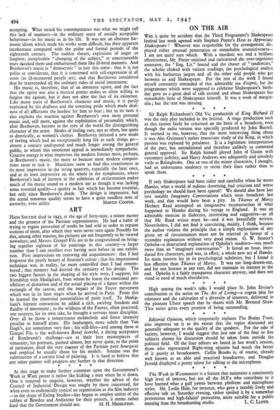ON THE AIR
WAS it quite by accident that the Third Programme's Shakespeare festival last week opened with Stephen Potter's How to Appreciate Shakespeare ? Whoever was responsible for the arrangement dis- played either unusual penetration or remarkable insensitiveness— I am not quite sure which. With a mordant wit and a brilliant effectiveness, Mr. Potter satirised and caricatured the over-ingenious annotator, the " Eng. Lit." hound and the chaser of " tendencies," the scholar choked with variant readings, the psychological analyst with his barbarous jargon and all the other odd people who get between us and Shakespeare. For the rest of the week I found myself constantly reminded of this admirable jeu d'esprit, for the programmes which were supposed to celebrate Shakespeare's birth- day gave us a great deal of talk around and about Shakespeare but remarkably little of Shakespeare himself. It was a week of margin- alia ; but the text was missing.
* * *
Sir Ralph Richardson's, Old Vic productioh of King Richard II was the only play included in the festival. A stage production such as this cannot fairly be criticised on the basis of a broadcast, even though the radio version was specially produced . by John Burrell. It seemed to me, however, that the most interesting thing about it was Alec Guinness's rather insouciant study of the King, in which passion was replaced by petulance. It is a legitimate interpretation of the part, but untraditional and therefore unlikely to command general approval. Sir Ralph himself played John of Gaunt with customary nobility, and Harry Andrews was adequately and unsubtly virile as Bolingbroke. One or two of the minor characters, I thought, had an unfortunate tendency to recite their lines rather than to speak them.
* * * *
If only Shakespeare had been tidier and carefuller when he wrote Hamlet, what a world of tedious theorising, bad criticism and worse psychology we should have been spared! We should also have lost two notable Imaginary Conversations which were broadcast last week, and that would have been a. pity. In Thieves of Mercy Herbert Read attempted an imaginative reconstruction of what happened to Hamlet during his voyage to England. It was an admirable exercise in dialectics, interesting and suggestive—as all that Mr. Read writes must be—and it was beautifully written. Nevertheless, I did not find it convincing, mainly, I think, because the author violates the principle that a simple explanation of any given set of circumstances must not be rejected in favour of a recondite explanation without very good reason. G. W. Stonier's Ophelia—a dramatised explanation of Ophelia's madness—was much more than an " imaginary conversation." It lasted an hour, intro- duced five characters, and was, in effect, a whole new act of Hamlet.
Its main interest lay in its psychological subtleties, but I found it less effective than Thieves of Mercy. It was too long-drawn-out, and for one listener at any rate, did not maintain its interest to the end. Ophelia is a fairly transparent character anyway, and does not stand in need of much elucidation.
* * * *
High among the week's talks I would place St. John Ervine's contribution to the series on The Art of Living—a cogent plea for tolerance and the cultivation of a diversity of interests, delivered in the pleasant Ulster speech that he shares with Mr. Bernard Shaw. This series gives every promise of being outstanding.
* * * * Editorial Opinion, which temporarily replaces The Brains Trust, also improves on it to the extent that the topics discussed are generally adequate to the quality of the speakers. For the sake of variety, however, I would suggest that just one of the four or five subjects chosen for discussion should be taken from outside the political field. Of the four editors we heard in last week's session, those who represented Right-wing opinion had much the better of it purely as broadcasters. Collin Brooks is, of course, already well known as an able and practised broadcaster, and Douglas Jerrold displayed a pretty talent for talking to the microphone. * * * The Week in Westminster is a feature that maintains a consistently high level of interest, but not all the M.P.s who contribute to it have learned what a gulf yawns between platform and microphone styles. Mr. Leslie Hale, for instance, who gave a notably lively and effective talk on Saturday evening, rather spoiled it by a somewhat pretentious and high-falutin' peroration, more suitable for a public
meeting than the broadcasting studio. L. C. LLOYD.


































 Previous page
Previous page